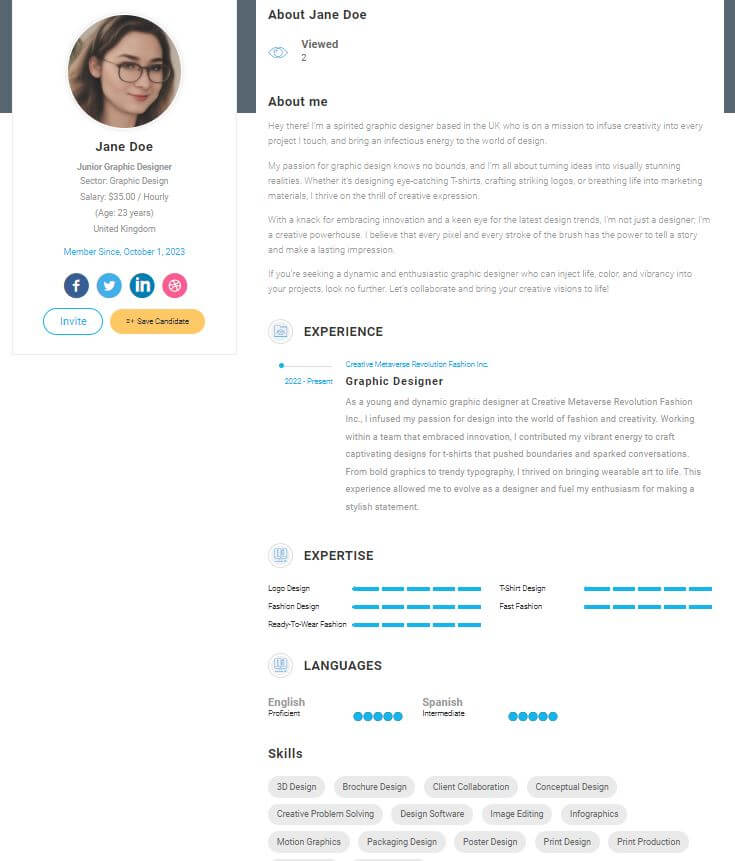Are you trying to find remote writing jobs and become a freelance writer, or get remote writing jobs offer that let you work from home as a writer?
As a beginner remote writer, it isn’t always easy to get started, and oftentimes the starting rate isn’t high.
How Much Do an Average Writer Earn?
A novice writer can get paid as low as $0.002/word, while an expert writer can go as high as $2.00/word (copywriters are in another category).

That is a whooping 1000 times difference between a novice and an expert.
Getting your rates up is key to being successful as a writer.
Understand What Does It Mean To Get a Remote Writing Job
Getting a remote writing job can be an exciting venture. You’re about to discover what it means and the advantages it brings to your professional life.
Remote Writing Jobs and Its Types
Remote writing refers to the act of creating written content without being physically present in a traditional office setting.
Freelance writing, such as producing articles, blogs, or marketing copy, is a popular type. Many of these jobs fall into different categories:
- Content writing: Crafting articles, blog posts, and web content.
- Copywriting: Writing persuasive content for marketing purposes.
- Technical writing: Creating user manuals, help guides, and FAQs.
- Ghostwriting: Writing under another person or brand’s name.
- Academic writing: Research-oriented writing including reports, theses, and journals.
Benefits of Working Remotely in Writing
The perks of a remote writing job can be substantial. Here’s why you might love the work-from-home life:
- Flexibility: Working from anywhere allows you to set your schedule around life’s other commitments.
- Cost Savings: Forget the daily commute. You’ll save on gas, wear and tear on your vehicle, and often on food and wardrobe.
- Increased Productivity: Many writers find they’re more productive without the distractions of an office.
- Work-Life Balance: Achieving a better work-life balance is often easier when you control your environment.
Remember, turning your passion for writing into a remote writing job means embracing the power of digital communication and the comfort of your home as a workspace.
How to Get a Remote Writing Job for Beginners
Getting a remote writing job today is the easiest ever, with specialized job boards like HQHIRE, ProBlogger and Freelance Writing, you can easily apply and get started in your writing career.
But if you want to make real money as a writer, you can’t just rely on apply and pray.
Having written over +1,000 articles, getting featured on Chron, CareerOneStop and Irish Times, and authoring books that is current sold on Amazon, I do have some golden nuggets to share if you are looking to get a job as a remote writer.
1. Develop Your Writing Skills

Landing a remote writing job begins with building a solid foundation in key writing skills.
Be proactive by identifying essential skills and integrating SEO practices to make your writing stand out.
Identify Writing Skills Required to Nurture for Beginners
First things first: You’ll need to pinpoint which writing skills are in demand.
Being a writer isn’t just about having good grammar or a sizable vocabulary. Content marketing is a fast-paced field, so you should be ready to craft engaging and informative content consistently.
Start by honing your ability to write clearly and convey complex ideas in a simple way.
Your writing samples should demonstrate an aptitude for research and an ability to adapt your tone for various audiences.
Enhancing Your Writing with SEO Practices
Now, let’s add some tech savviness to your writing.
Understanding SEO is crucial for a writing job, especially in content marketing.
SEO, or Search Engine Optimization, involves creating content that’s easily discoverable by search engines.
Learn to weave relevant keywords naturally into your articles.
Remember, SEO isn’t just about keyword stuffing; it’s also about creating user-friendly content that answers your readers’ questions.
(Please don’t keyword stuff, it makes your content hard to read!)
Get familiar with keyword research tools and master the art of crafting headlines that balance keyword integration with curiosity-piquing phrases.
2. Gain an Understanding on The Types of Writing Jobs Suitable for Beginners

Freelance writing is pretty exciting, but you might wonder where to begin.
With so many options available, it’s crucial to find gigs well-suited to those just starting.
Content Writing
Content Writing stands out as a foundational opportunity.
Here, you’ll craft informative articles and blog posts. This type of work hones your ability to explain complex ideas simply and engagingly.
It’s also a space where keywords matter—a core skill for boosting online visibility.
Copywriting
Copywriting is the art of persuasion.
In these projects, becoming familiar with creating compelling calls-to-action can open doors to more lucrative assignments.
Your goal is to motivate readers to take specific actions, like making a purchase or signing up for newsletters.
Email Marketing Writing
Email Marketing Writing requires a personal touch.
You’re tasked with engaging an audience through newsletters and promotional emails. Personalizing content while maintaining the brand’s voice is key to success in this niche.
Email Marketing Writing
Social Media Writing is perfect for those with a knack for concise and catchy communication.
Penning posts for various social media platforms allow for creative expression and the chance to engage with trending topics.
Just Get Started
Start simple, gain experience, and watch your freelance writing journey unfold.
Jumpstart your career with gigs like writing a personal blog or creating product description. These allow you to fine-tune your skills without being overwhelming.
They also provide the chance to build a versatile portfolio that showcases a range of writing styles and topics.
Remember, each piece you write enhances your expertise, paving the way to more complexity and variety in your work.
3. Finding Your First Remote Writing Job

Landing your initial remote writing gig can be a mix of strategy and perseverance.
Here’s how you can harness various platforms and networking opportunities to kickstart your freelance journey.
Using Job Boards and Freelance Platforms Effectively
Begin your job search on popular job boards and platforms like Fiverr, Upwork, HQHIRE and others focused on remote work.
Create a profile that showcases your writing prowess—think of it as your digital storefront.
On these sites, filter for remote freelance writing jobs that align with your skills and competencies.
Customize your applications; generic pitches are easy to spot and often ignored. To stand out, craft compelling proposals that reflect your understanding of the client’s needs.
Networking and Finding Writing Opportunities
While job boards are great, networking can open doors to opportunities not advertised.
Engage in online communities and social media groups where freelance writers and potential clients gather.
Your objective is to become a known entity; someone they will remember and consider for future freelance work.
Spark conversations, share insights, and provide value. Your efforts in these communities can lead to direct referrals and gigs.
While you’re building relationships, concurrently fine-tune your craft, and always be on the lookout to find freelance projects that match your expertise.
4. Creating an Appealing Online Presence

To snag that ideal remote writing job, your online presence must showcase your skills and professionalism.
Think of the internet as your global stage; it’s where potential employers first encounter your work.
Setting Up a Professional Portfolio
Construct a portfolio that highlights your talent as a freelance writer.
Begin by selecting a clean, easy-to-navigate platform where you can display your best writing work. Here’s a quick list to get you started:
- Bio: A concise professional summary about you.
- Samples: Varied writing samples that showcase your range and expertise.
- Testimonials: Positive feedback from past clients or colleagues.
- Contact Information: A straightforward way for potential clients to reach you.
Streamline your portfolio to cater to the writing opportunities you’re most interested in, whether that’s blog posts, technical writing, or creative pieces.
Effective Use of Social Media for Job Search
Leverage social media to find freelance writing jobs.
Twitter, LinkedIn, and even Instagram can be tools for you, the budding remote writer, to network and display your writing ability. When using these platforms:
- Engage: Follow companies and join writing groups. Interact with content related to your desired writing career.
- Share: Post your articles, writing tips, and client testimonials to demonstrate your expertise.
- Professionalism: Always keep your profiles polished and employer-friendly.
Remember, a strategic social media approach can lead to valuable writing opportunities and connections in the world of online job hunting.
5. Landing the Job and Building Experience

Navigating the remote writing landscape as a beginner can be challenging, but with a focused approach, you can secure opportunities and grow your writing business.
Let’s explore how to craft standout applications, utilize feedback to enhance your skills, and make the transition to a full-time remote writing career.
Crafting Proposals and Applications
To snag that entry-level remote writing job, start by checking job listings specifically for work in writing remotely.
Your applications and proposals should highlight some key areas,
- Show them your enthusiasm.
- Mention any relevant experiences.
- Demonstrate transferable skills.
Keep your applications concise, but ensure they showcase your ability to communicate effectively—this is your first work sample, after all.
Learning from Feedback and Building Your Resume
With each application or freelance project, pay close attention to the feedback you receive—it’s a goldmine for your development.
- Use positive comments as testimonials and constructive criticism to refine your craft.
- As your experience grows, so should your resume thus you need to update it regularly.
- Continuously update it to reflect the breadth of your work, including any successful remote projects or collaborations.
This document isn’t just a formality; it’s your professional storyteller.
Transitioning from Part-Time to Full-Time Remote Writing
As you get your footing with part-time gigs and freelance projects, keep an eye on the endgame: transitioning to full-time remote writing.
Build a robust portfolio of your work and establish a steady workflow that proves your reliability.
Don’t be afraid to network with others in the writing business as these connections can often lead to more consistent work.
Remember, every piece you write is a step further in your remote writing journey.
Get your 100% Free online resume and get noticed by potential employers. Start out of the crowded space of millions of remote job seekers and find the remote job that you will enjoy and love.

Read Also:
- 21 Common Performance Appraisal Meeting Questions (with Example Answers)
- How to Prepare for an Online Meeting with Your Boss (Effective Meeting Strategy)
- 20 Best Skip Level Meeting Questions To Ask (2-Way Communication with Bosses and Managers)
- How to Prepare for a Performance Appraisal Meeting (Acing Your Review with Confidence)
- How to Prepare for a Skip-Level Meeting as an Employee (with Example Questions)
Join over 11,000+ achievers who are committed to achieving their career goals!






